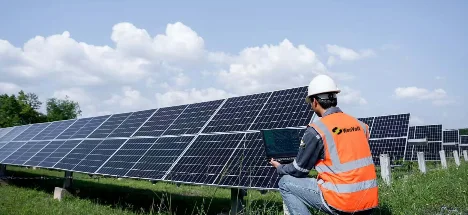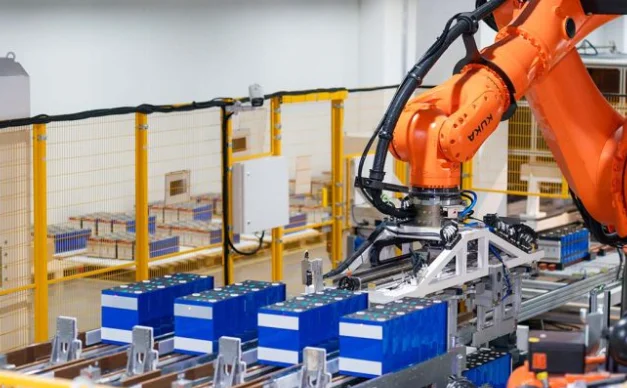Wazo la kuunganisha paneli za jua na kuhifadhi betri si tena kwa watumiaji wa mapema au wapenzi wa mazingira. Katika miaka ya hivi karibuni, biashara, wamiliki wa nyumba, na hata jamii za vijijini wameanza kutibu betri za jua pamoja na betri kama mkakati mkuu wa nishati. Pamoja na bidhaa za umeme zinazoongezeka, gridi chini ya dhiki, na serikali zinazotupa ruzuku mpya, mazungumzo yamebadilika kutoka "Je, hii inawezekana?" hadi "tunaweza kuifunga haraka gani?"
Kampuni kama vile WonVolt ya, iliyoanzishwa mwaka 2016 katika Hefei, China, ni kuunda mabadiliko haya. Wataalamu katika mifumo ya kuhifadhi nishati ya viwanda na kibiashara (ICESS) na wametoa miradi katika nchi zaidi ya 90. Nyongozo yao ni mbalimbali kutoka moduli za jua za ufanisi wa juu kama mfululizo wa WV-72KUN-605, kwa betri za LiFePO4 za makazi kama vile WV51100L, hadi kubwa za container Ufumbuzi wa BESS Kutoa hadi 3.4MWh kwa kitengo. Kwa maneno mengine, wao si tu kufanya vifaa - wao ni kubuni kamili nishati mifumo ya mazingira.

Nini Inafanya Uhifadhi wa Batri ya Jua Uwekezaji wa Thamani
Kuongezeka kwa gharama za umeme
Gharama za nishati mara chache hupungua kwa muda mrefu. Katika sehemu fulani za Ulaya, viwango vya umeme wa viwanda viliongezeka kwa zaidi ya asilimia 50 katika miaka miwili iliyopita. Katika Afrika Kusini, umeme wa umeme ulifanya viwanda viweze kutumia dizeli, ambayo ni ghali zaidi. Katika hali kama hizo, kuhifadhi jua pamoja ni chini kuhusu kuwa "kijani" na zaidi kuhusu kuishi msingi. Kwa moduli ya 605W kutoka kwa WonVolt kwenye paa na betri ya HV iliyowekwa kwenye rack katika chumba cha nyuma, biashara zinaweza kuondoa maelfu ya bili za kila mwaka.
Kuongezeka kwa Mahitaji ya Uhuru wa Nishati
Uliza mwenyeji yeyote wa nyumba ambaye aliishi kupitia siku tatu za kizazi kama uhuru ni muhimu. Jibu ni daima ndiyo. Batri za jua huwapa watu hisia ya kudhibiti. Fikiria kuendesha bakery nchini Thailand, ambapo kukata umeme huharibu unga na kuharibu utoaji. Kwa benki ya betri ya WV51300L, bakery hiyo huweka tanuri moto na wateja furaha. Uhuru wa nishati si anasa; Hii ni sera ya bima.
Kuongeza Msaada na Misaada
Serikali kutoka Marekani hadi Ujerumani sasa hutoa mikopo ya kodi au punguzo kwa ajili ya kuhifadhi nishati. Hata vijijini China inaona shinikizo la kusambazwa kwa nishati mbadala. Motisha hizi hupunguza kipindi cha kulipa na kufanya gharama ya awali kuwa ya kutisha. Kwa biashara kuzingatia WonVolt containerized BESS, mchanganyiko wa ruzuku na maisha ya mzunguko mrefu (> 6000 mzunguko) mara nyingi hubadilisha kusisitiza katika hatua.
Jinsi ya Kuboresha Batri ya Jua ya Nishati
Peak Shaving na Usimamizi wa mzigo
Magari mengi gharama zaidi wakati wa masaa ya kilele. betri kuruhusu watumiaji kuhifadhi nafuu mchana jua na kutolewa usiku wakati mahitaji spikes. Kiwanda cha viwanda nchini Iraq kiliweka mfumo wa WonVolt 1.5MWh. Kwa kubadilisha mizigo, hawakuokoa fedha tu lakini pia kupunguza dhiki kwenye gridi ya ndani.
Kupunguza Habara ya Nishati ya Jua
Bila betri, jua la ziada hurudi kwenye gridi kwa viwango vya chini - au mbaya zaidi, hupunguzwa. Kwa kuhifadhi, kila mwanga wa jua unachukuliwa. Fikiria kama kununua matunda safi. Ikiwa unakula mara moja, ni bora. Lakini kama huna friji, huharibika. Batri ni kwamba friji kwa ajili ya mavuno yako ya jua.
Utoaji thabiti wakati wa mabadiliko ya gridi
Nchi nyingine zinakabiliwa na mabadiliko makubwa ya voltage. BMS akili, kama moja kujengwa katika miputo ya makazi WonVolt ya, smooths nje ya mabadiliko hayo. Si glamorous, lakini inaokoa vifaa nyeti kutoka kuvunjika na kupanua maisha ya kifaa.
Kwa nini Wamiliki wa Nyumba na Biashara Wanapaswa Kuzingatia Ufumbuzi wa WonVolt
Paneli za Jua za Ufanisi wa Juu na Teknolojia ya Aina ya N
WonVolt ya 72KUN na 66KUN modules kufikia ufanisi hadi 23.4%, kwa kutumia N-aina ya TOPCON seli. Kwa miradi ya huduma, kwamba kutafsiri katika mazao ya juu kutoka eneo moja la ardhi faida kubwa wakati kila mita ya mraba kuhesabu.
Advanced LiFePO4 betri kwa Long mzunguko Maisha
Mifano kama vile WV51100L (5.12kWh) na WV51300L (15.36kWh) hutumia kemia salama ya LFP na mizunguko zaidi ya 6000. Hii ni matumizi ya kila siku ya miaka 15. Linganisha hiyo na mbadala za bei nafuu ambazo hupungua baada ya mizunguko ya 2000-3000, na tofauti ni wazi.
Scalable BESS Chaguzi kwa ajili ya Miradi ya Makazi na Viwanda
Kutoka mfumo wa nyumbani wa villa ya 30kWh nchini Myanmar hadi mradi wa paa la viwanda wa 3.4MWh nchini Afrika Kusini, WonVolt inakubaliana na kiwango. Mfululizo wao wa ZeusVolt wa container hutoa ufungaji wa plug-and-play, ikiwa ni pamoja na baridi ya kioevu na ulinzi wa moto wa jumuishi. Hii si tu betri. Ni kituo cha nishati.
Jinsi Hifadhi ya Batri ya Jua Inachangia kwa Endelevu
Chini ya Carbon Footprint
Kila kilowatt-saa iliyohifadhiwa na kutumika ndani ina maana ya kutegemea chini ya makaa ya mawe au dizeli. Kiwanda kubadili kwa jua pamoja na BESS kuepuka tani za CO ₂ kila mwaka. Si abstract-ni tofauti kati ya kuendesha jenereta ya dizeli usiku wote na kuruhusu seli za lithium kimya kubeba mzigo.
Msaada wa Kupitia Nishati mbadala
Gridi hupigana na upepo na jua. Batteries laini juu na chini hizo. Mifumo ya rack ya WonVolt, na uwezo wa hadi 243kWh kwa kundi, hufanya iwe rahisi kwa huduma kukubali hisa za juu za nishati mbadala bila blackouts.
Kuboresha Nishati Resilience katika Maeneo ya Mbali
Katika mikoa kama vile vijijini Afrika au sehemu za milima za Myanmar, uhusiano wa gridi ni dhaifu au haupo. BESS iliyotengenezwa na vyombo iliyounganishwa na paneli za ufanisi wa juu huunda microgrids ambazo zinatumia shule, mashamba, au kliniki. Athari ya binadamu hapa ni kubwa kuliko chati yoyote ya ROI.
Ni faida gani za kifedha za kuchagua kuhifadhi betri ya jua
Muda mfupi wa kulipa na mifumo ya kisasa
Mifumo ya zamani ilichukua miaka 10-12 kuvunja hata. Leo, kwa bei ya chini ya jopo na ufanisi wa juu, baadhi ya mipangilio ya makazi hit kulipa katika miaka 5-7. Dhamana ya WonVolt - miaka 10 kwa betri na hadi miaka 30 kwa paneli - inafunika mzunguko huo mzima.

Kuongezeka kwa thamani ya mali
Wanunuzi wanaongezeka kutafuta nyumba zenye uhuru wa nishati. Villa na 14kWh stackable mfumo mara nyingi kuuza haraka na kwa premium ikilinganishwa na moja bila. Realtors sasa kuonyesha "jua pamoja na kuhifadhi" kama kipengele, kama countertops granite au bwawa la kuogelea.
Kupunguza Bili za Nishati za Muda mrefu
Hii ni moja kwa moja. Kutengeneza nguvu yako mwenyewe, kuhifadhi, na kutumia wakati unahitajika. Wastani wa nyumba za Marekani hutumia takriban dola 1500 kwa mwaka kwa umeme. Kupunguza hilo kwa nusu na betri ya jua pamoja na, na zaidi ya miaka 15, umeokoa zaidi ya $ 11,000.
Jinsi ya Teknolojia Innovation kuunda baadaye ya betri ya jua
Mifumo ya Usimamizi wa Batri ya Akili
WonVolt inajumuisha BMS ya juu ambayo kuwasiliana kupitia CAN / RS485. Hii si tu maelezo ya karatasi ya spec - ina maana ya ufuatiliaji wa wakati halisi, ulinzi dhidi ya malipo ya juu, na utambuzi wa mbali.
Maisha ya muda mrefu na baridi ya kioevu na chaguzi za baridi ya hewa
Joto ni adui ya betri. WonVolt ya kioevu-baridi makabati kuweka seli joto tofauti chini ya 3 ° C, kupanua maisha na 30%. Hiyo ndiyo aina ya uhandisi wa maelezo wanaopenda, lakini wamiliki wa nyumba pia wanafurahia kutobadilisha betri haraka sana.
Utanganisho na Biashara ya Inverter ya Kuongoza
Mifano ya makazi hufanya kazi na SMA, Victron, Solis, na wengine. Hii ni muhimu kwa sababu wateja wengi tayari inverters. Utanganisho hupunguza mgogoro na hupunguza gharama za kuboresha jumla.
Kwa nini Sasa Ni Muda Bora wa Kuwekeza katika Hifadhi ya Batri ya Jua
Kupungua gharama za paneli na betri
Katika 2024, bei ya moduli ilipungua karibu 30% mwaka kwa mwaka. Gharama ya lithium pia ilipungua. Kusubiri inaweza kuokoa zaidi kidogo, lakini wakati fulani, akiba iliyopotea kwenye bili zako huzidi kupungua kwa bei ndogo.
Msaada wa Serikali na Maendeleo ya Sera
Sera nchini China, Marekani, na Ulaya zinahimiza usambazaji wa nishati mbadala. Katika mikoa mingine, kupima sawa ni kupunguzwa, na kufanya matumizi ya kibinafsi na betri hata thamani zaidi.
Rekodi ya Kuthibitishwa ya Miradi ya Kimataifa
WonVolt imefanya miradi nchini Tanzania, Bulgaria, Ukraine, na zaidi. Kutoka paa la kibiashara la 254kW hadi mimea ya kiwango cha megawatt, teknolojia imejaribiwa katika hali halisi - si maabara tu. Wakati kampuni tayari ina mifumo inayoendesha katika nchi zaidi ya 90, hiyo ni ushahidi wa kutosha kwa wawekezaji wengi.
Maswali ya kawaida
Q1: Ni kwa muda gani betri za jua za WonVolt zinaendelea?
Jibu: Mifano mingi ya WonVolt LiFePO4 inazidi mzunguko wa 6000, ambayo inatafsiriwa kwa miaka 15 ya matumizi ya kila siku ya kawaida.
Q2: Je, mifumo ya WonVolt inaweza kufanya kazi kwenye gridi na nje ya gridi?
Jibu: Ndiyo. Mifano ya makazi na ya kibiashara inasaidia uendeshaji wa hybrid. Wateja wanaweza kulisha umeme nyuma kwenye gridi, au kukaa huru katika maeneo ya mbali.
Q3: Ni aina gani ya baada ya mauzo msaada inapatikana?
J: WonVolt hutoa wote kabla ya kuuza tovuti tathmini na baada ya ufungaji msaada, ikiwa ni pamoja na commissioning vipimo na mafunzo kwenye tovuti. Wahandisi wao wanapatikana ulimwenguni kote kupitia washirika wa ndani.

